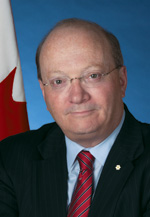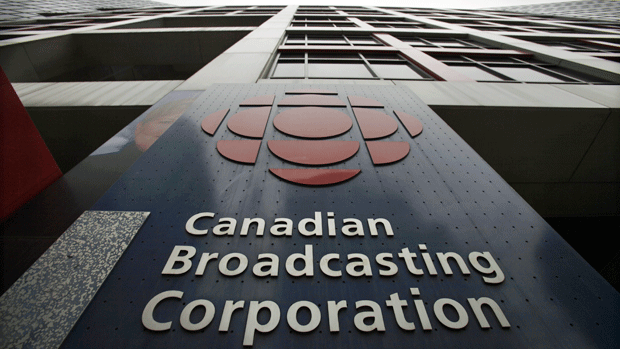
Senator Hugh Segal
Yesterday, Senator Hugh Segal made a motion in the 1st Session of the 41st Parliment that the senior management of the Canadian Broadcasting Corporation (CBC) explain the decision to cut funding of Radio Canada International by 80%, in light of RCI being Canada’s voice to the world and that shortwave serves those, ” in oppressed regions worldwide that are denied access to the Internet.”
His motion is beautifully articulated. It echoes many of the points we make here on the SWLing Post about why shortwave radio is still a vital national and international resource in the Internet age.
Regarding the unfair portion of cuts that RCI received, Senator Segal stated:
My concern is not that CBC senior management decided to reduce RCI’s budget. I would have preferred that CBC had not received a 10 per cent cut. Facing a 10 per cent cut, however, it is understandable that CBC management sought economies in the corporation. My concern is that, when a 10 per cent cut in the core grant produces an 80 per cent cut in one service, a vital and important international service, someone has made a focused and direct choice to target one aspect of the network for effective shutdown. While the management and the board of the CBC are and should be at arm’s length and while they make their own choices, that does not mean that they are not accountable for the choices they make. One area of accountability should be facing questions from this chamber, as well as the other chamber of Parliament, when necessary.
Again, his full motion (below) makes a well-rounded argument that RCI should not have been cut and the decision lacked accountability.
The timing of Senator Segal’s motion coincides with a very successful petition that asks the Misters of Heritage and Public Safety to stop the dismantling of the RCI Sackville transmission site. Please, if you haven’t already, sign this petition and share it with your friends and radio networks.
Below, please find the text of Senator Segal’s motion in its entirety:
Hon. Hugh Segal, pursuant to notice of June 29, 2012, moved:
That, at the end of Question Period and Delayed Answers on the sitting following the adoption of this motion, the Senate resolve itself into a Committee of the Whole in order to receive senior management and officials of the Canadian Broadcasting Corporation to explain their decision to cut funding to Radio Canada International services by 80%, particularly in view of the importance of
(a) Radio Canada International as the voice of Canada around the world; and
(b) short wave radio in oppressed regions worldwide that are denied access to the Internet.
He said: Honourable senators, I move this motion as a friend and supporter of Radio-Canada International but also as a friend and supporter of public broadcasting in Canada. It was in 1985, after the election of the Mulroney Progressive Conservative administration, that a group of Canadians from different walks of life, including Adrienne Clarkson; Peter C. Newman; Lois Wilson, the former moderator of the United Church of Canada; Keith Morrison; the Rev. David MacDonald; David Suzuki and others gathered to form the FRIENDS of Canadian Broadcasting to organize, advance and protect the role of public broadcasting in Canada, including Radio-Canada, CBC, TVO and others. It was a privilege to be a part of that group.
The fact that the Mulroney Progressive Conservative administration increased the amount of CBC TV networks, built a new state of the art broadcast headquarters in Toronto, made other investments in the CBC and Radio-Canada and began the important commitment to TV5 speaks to the broad and non-partisan place of public broadcasting in the mixed market economy and pluralist society that Canada has become.
[Translation]
I would like to congratulate Senator Andrée Champagne, who is part of this government, and Senator Marjorie LeBreton, who was the Deputy Chief of Staff to the Prime Minister at the time. Both have made a great contribution to this important area.
[English]
My concern is not that CBC senior management decided to reduce RCI’s budget. I would have preferred that CBC had not received a 10 per cent cut. Facing a 10 per cent cut, however, it is understandable that CBC management sought economies in the corporation. My concern is that, when a 10 per cent cut in the core grant produces an 80 per cent cut in one service, a vital and important international service, someone has made a focused and direct choice to target one aspect of the network for effective shutdown. While the management and the board of the CBC are and should be at arm’s length and while they make their own choices, that does not mean that they are not accountable for the choices they make. One area of accountability should be facing questions from this chamber, as well as the other chamber of Parliament, when necessary.
When a shortwave service, which has been serving the Canadian ideal, Canada and the world, is closed after 67 years, this is not a trivial administrative decision. When a service that could reach around the world is cut to an Internet-based service that will be accessed by only a fraction of the world and only the wealthier fraction at that, this is not a trivial decision. When the separate programming base that produced a global Canadian program mix for RCI, which was shaped for an international audience, becomes a derivative, Internet-based, repeater station, that is also not a trivial decision.
Did anyone afford listeners or Canadians generally a policy paper or plan of action before the announcement was made? No. Were different options for RCI discussed internally? No. Was there a plan to see if different Canadian broadcasters might wish to collaborate on a reconfigured international service? No.
Acting as ruthlessly and capriciously as a private broadcaster that only matches mission with income and avoids more challenging missions might be the CBC’s idea of the rational way ahead. However, if they are going to cut and slash as a private broadcaster might, why do we need a public broadcaster? If it is all about news, hockey and the bottom line, there are private broadcasters who can fill this role at an even greater savings to the Canadian taxpayer. That would not be what I would ever hope for. However, every time the CBC pretends to have no greater duty to its audience than a private broadcaster might, it is the CBC that validates the private option. I believe that a committee of this chamber or a Committee of the Whole, as is in the motion, might well call the CBC management before it to address a few questions that fly in the face of this CBC management decision. I will conclude with these brief questions.
Why has RCI been on the CBC’s own cut agenda since 1991?
What are the foreign and trade policy impacts of denying China Radio International use of our transmitters, which will happen when Sackville is closed? What are the implications of that? When was the decision made to let them use our facilities and at what cost?
Will CBC management consult with the broader community, including the residents of Sackville, New Brunswick, with respect to the disposition of those transmitters?
Why did we have fewer program hours on our international shortwave service, long before the cuts, than the BBC, Voice of Russia, Deutsche Welle, Radio Cairo, All India Radio, NHK World Radio Japan, Radio France Internationale, Voice of Turkey, Radio Pyongyang, Radio Bulgaria, Radio Australia, Radio Tirana, Radio Romania International, Radio Exterior de España, RDP Internacional, Radio Havana and Radio Italia.
Shortwave service and listeners are increasing massively, according to the BBC. In China, production of shortwave radios cannot keep up with demand worldwide, Grundig’s production cannot keep up either. Yet we are exiting this medium of transmission. Why?
There is no limit to who can listen to shortwave, yet world Internet usage, while growing, has no such potential or present reach. In Africa, less than 20 per cent have access to the Internet. In Asia, it is less than 30 per cent. In the Middle East, it is less than half. In developing countries, the percentage is even higher. When dictatorships do not like a message on the Internet, they simply block it, as RCI’s message is now blocked in the People’s Republic of China and was blocked by the former Egyptian regime before a form of democracy ensued in that country. Does the end of creative programming for the international community represent a CBC decision that the international world no longer matters to the CBC or to Canada?
Was there no middle ground, no more modest cutting scenario possible, aligned with the actual 10 per cent cut as opposed to the shutdown? Was an 80 per cent cut the only rational option?
Honourable senators, I commend the motion before you for your consideration and assessment and hopefully your engagement and debate.
I know that there are cultural and artistic aspects that I have not discussed but that others are planning to, with more expertise than I could bring to bear on that issue. I look forward to others participating either in the debate on this motion or before hearings that may occur based on its provision. It may well be that CBC management has decided to move on, to make RCI and its message of freedom, dissent, diversity, democratic debate and robust cultural creativity a thing of the past.
(1600)
I would hope that when arrogance reflects no will to consult, no will to array options, no openness to look for less draconian solutions when it crests on an issue like this, even within a proud, compelling and high-quality public broadcaster, which the CBC is, at least in this chamber there will be some will to ask some very tough questions.
Some Hon. Senators: Bravo!







